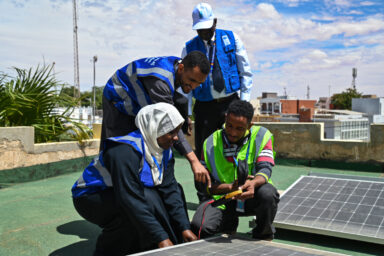How District Heating Can Speed Switch to Clean Energy
PICKS are stories from many sources, selected by our editors or recommended by our readers because they are important, surprising, troubling, enlightening, inspiring, or amusing. They appear on our site and in our daily newsletter. Please send suggested articles, videos, podcasts, etc. to picks@whowhatwhy.org.
|
Listen To This Story
|
‘The Heat You Need at a Reasonable Price’: How District Heating Can Speed Switch to Clean Energy (Maria)
The author writes, “District heating is sometimes talked about like some kind of unattainable utopia, but in the Swedish capital these low-carbon heating networks are not special. In fact, district heat is so run-of-the-mill that many Stockholmers do not know that they have it, said Fredrik Persson, as he showed the Guardian around Stockholm Exergi’s pioneering power station in Norra Djurgårdsstaden, a former port and industrial area.”
The Real Outrage About the Yemen Signal Group Is That It Called for Attack on Civilian Home (Laura)
The author writes, “The American political landscape has been rattled by revelations that the Trump administration discussed plans to strike Houthi rebels in Yemen in a chat group containing a journalist from The Atlantic. Senior Trump administration officials are facing tough questions about their operational security, use of consumer technology, and even their emoji usage. So far, however, there has been little focus on the specifics of the attack, much less discussion of the fact that one of the targets of the March 15 strike was a civilian residence.”
Republicans Just Made It Easier for Banks to Screw People Over (DonkeyHotey)
From The New Republic: “Senate Republicans voted Thursday to overturn a $5 cap on bank overdraft fees, leaving working-class people vulnerable to exploitation from financial institutions. The Consumer Financial Protection Bureau adopted the cap late last year. It was scheduled to take effect later in 2025. The rule was meant to protect consumers from unreasonable fees levied by banks and credit unions, saving consumers an estimated $5 billion per year total.”
One of Utah’s Most Popular National Park Hikes Closes Indefinitely Due to Staffing Shortage (Reader Steve)
From Backpacker: “Best known for its towering sandstone slot canyons and semi-technical terrain, the Fiery Furnace garnered so much attention in the 1990s that park officials put a permitting system into place to ensure that no more than 75 people could enter the area per day. In a normal year, Arches National Park receives nearly 2 million visitors. The park relies on seasonal employees to accommodate hikers and monitor the Fiery Furnace hike. However, both ranger-led programs and self-guided trips in the area are staff-intensive according to the park, which has left officials with no choice but to close the hike.”
The Story of One Woman Who Fell Prey to the Medical Freedom Movement (Russ)
From The New York Times: “While only a small percentage of people diagnosed with cancer reject standard medical care entirely, surveys have found that one in five Americans has used alternative medicine in place of conventional medicine at some point. Nearly one in three Americans has reported avoiding doctors, often owing to distrust of the medical system or a history of negative experiences.”
It Turns Out Sharks Make Noises, and Here’s What They Sound Like (Dana)
The author writes, “Sharks have long been believed to be silent, stalking their prey and wolfing them down without comment. They’re ruthless and efficient. But a team of marine biologists in New Zealand are challenging that assumption. In a new study published in the journal Royal Society Open Science, the researchers report that they’ve recorded the first ever instance of a shark actively producing a sound, in the form of sharp, abrupt clicks.”




